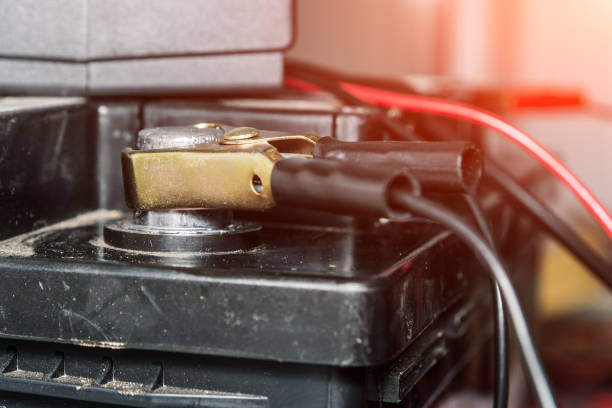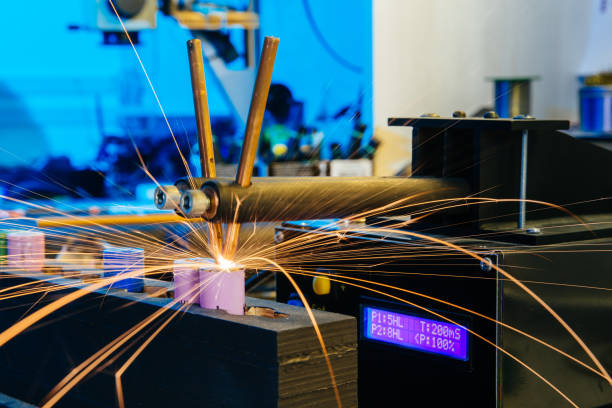Battery welding is a crucial and precise manufacturing process that involves joining the various components of a battery through the application of controlled heat and pressure. This specialized welding technique ensures the seamless integration of battery cells, terminals, and other components, contributing to the structural integrity and overall performance of the battery.
The welding process plays a pivotal role in enhancing the reliability and longevity of batteries, as it ensures secure connections and minimizes the risk of electrical resistance or failure. With advancements in technology, automated welding equipment has become increasingly prevalent in battery production, bringing unparalleled precision, efficiency, and cost-effectiveness to the manufacturing process.
Whether it’s for lead-acid or advanced lithium-ion batteries, battery welding stands at the forefront of ensuring the quality and durability of energy storage solutions across various industries. As the trend for electric vehicles and energy storage systems continues to grow, the importance of cell welding in battery manufacturing cannot be overstated.
Some key points to consider
Precision and Reliability
Cell welding is critical for ensuring the precision and reliability of battery cells. Battery cells are essential for the performance, safety, and longevity of electric vehicles and stationary energy storage systems.The integrity of the welds directly impacts the overall structural integrity of the battery pack, making it a pivotal aspect of the manufacturing process.
Efficiency and Cost-Effectiveness
The quality of cell welding directly impacts the efficiency and cost-effectiveness of battery production. Advanced welding techniques, such as laser welding and ultrasonic welding, contribute to reduced production time, minimized material waste, and enhanced overall productivity. This, in turn, plays a significant role in driving down the cost of battery systems, making them more accessible to consumers.

Innovation and Advancements
Ongoing research and development in cell welding technologies are driving innovations in battery manufacturing. From advancements in electrode design to the integration of smart welding systems, the evolution of cell welding techniques is paving the way for improved performance, longevity, and sustainability of battery systems. These innovations are instrumental in meeting the evolving demands of the electric mobility and clean energy sectors.
Quality Control and Safety Standards
Stringent quality control measures and adherence to safety standards in cell welding are imperative to produce high-quality, durable batteries that meet industry regulations and consumer expectations. Robust quality assurance processes, including non-destructive testing and real-time monitoring, play a crucial role in identifying potential defects and ensuring the safety and reliability of battery packs.
About MK welding equipment
MK Energy Company stands at the forefront of innovation in the production of batteries, employing state-of-the-art automatic welding equipment that has revolutionized the manufacturing process. This technological leap has not only enhanced the precision of welding but has also ushered in a new era of efficiency, cost savings, and heightened automation within the workshop.
As MK Energy continues to refine and optimize its production processes, the benefits of automation extend beyond the confines of the workshop. The assurance of product quality, made possible by automated welding, resonates with customers who rely on MK Energy’s batteries for various applications. Whether powering homes, industrial complexes, or commercial storage facilities, the end-users can trust in the reliability and durability of batteries crafted with the utmost precision.
In terms of product offerings, MK Energy stands out for its diverse range of batteries, with a focus on Lithium Iron Phosphate (LiFePO4) batteries and lead-acid batteries. These two categories find extensive applications in home storage, industrial, and commercial storage, contributing to the resilience and sustainability of power solutions across diverse sectors.
MK Energy ‘s dual focus on both Lithium Iron Phosphate and lead-acid batteries highlights its commitment to offering a comprehensive suite of energy storage solutions. This strategic approach enables the company to cater to diverse market needs, providing customers with the flexibility to choose the most suitable battery technology for their specific requirements.
In conclusion
MK Energy Company’s integration of automatic welding equipment in battery production signifies a leap forward in efficiency, precision, and automation. This commitment to technological advancement extends to its diverse range of battery products, where Lithium Iron Phosphate batteries and lead-acid batteries play pivotal roles in powering homes, industries, and commercial establishments. As the company continues to navigate the dynamic landscape of energy storage, its dedication to innovation positions MK Energy as a key player in shaping the future of sustainable and reliable power solutions.
For more industry news, please continue to pay attention to website updates or follow our social media accounts.

